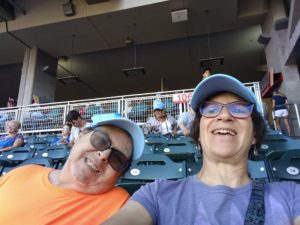 “An artist needs to be something like a whale swimming with his mouth wide open, absorbing everything until he has what he really needs.”–Romare Beardon
“An artist needs to be something like a whale swimming with his mouth wide open, absorbing everything until he has what he really needs.”–Romare Beardon
Ten days into 2022, I lost my brother, Danny–an unexpected death due to an imploded port. The malfunction had scheduled for repair, but that had been delayed due to COVID (one of many statistics that would not be included in the pandemic’s path of destruction). Beset with mental illness from the age of 15, which was later accompanied by a host of physical problems, Danny’s life was not easy and neither was our relationship. Yet, as teens, we bonded over baseball and rock music. I’d play the guitar and we’d sing together. Danny would ask me to listen as he turned the amp on high and belted along with The Who’s “Won’t Get Fooled Again.” As his illness became worse, he got more delusional about being a rock star, his stubborn insistence occasionally edging on violence when my parents tried to curtail the raucous sound from being blasted out into the neighborhood.
When I think of what I “absorbed” this year, this sad life event from early January continues to stand out despite its countering with one of my happiest life events: the birth in September of my grandchild, Manu. 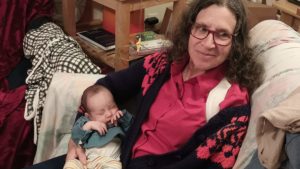 Both have inspired a lot of writing, and watching the awe and wonder with which Manu approaches the world fills me with a poignancy hard to describe without resorting to clichés about both the preciousness and fragility of life, and how one of the most healing things we can do for grief (at least for me) is to continue to practice gratitude and look forward, even as we continue to struggle to make sense of the cracks in our past.
Both have inspired a lot of writing, and watching the awe and wonder with which Manu approaches the world fills me with a poignancy hard to describe without resorting to clichés about both the preciousness and fragility of life, and how one of the most healing things we can do for grief (at least for me) is to continue to practice gratitude and look forward, even as we continue to struggle to make sense of the cracks in our past.
Meanwhile, the echoes of Won’t Get Fooled Again continue to resonate as a backdrop on my musings, as in the song I can feel both the anger at the state of the world and (despite the sarcasm) the hope of better tomorrows that don’t need to be mere delusions. I say this after reading about the Governor of Texas sending busloads of migrants to the Vice President’s House in subfreezing weather on Christmas Eve–an anti-nativity story if there ever was one. However one feels about the situation at our borders, it’s this kind of deliberate cruelty that triggers my anger at both sides of the government for “fooling us” into thinking that they care. And yet, I hang on to the hope of better tomorrows, reflected in the many people who are on the streets, helping migrants and other unhoused people who are stranded in the cold.
I’m determined not to get fooled (or worse, despondent) in 2023. Out of grief comes hope, the awe of new discovery, and the determination to work for a better world.
To subscribe to this blog, sign up at ddinafriedman.substack.com

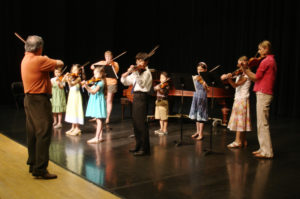 No one expects the audience to have a great musical experience hearing them; yet, this teaches these children early on that they have a voice and what they are saying through their music matters enough for people to listen to them despite their flaws and inexperience. This is an important lesson not only for the children, but for everyone in our goal-oriented society. Our all-or-nothing approach when it comes to fame and accomplishment minimizes the personal sharing of one’s art on whatever “level” it’s at, and amplifies only those who reach the highest bars of success, causing many to quit and abandon their own artistic voices when they realize they’re never going to reach that level.
No one expects the audience to have a great musical experience hearing them; yet, this teaches these children early on that they have a voice and what they are saying through their music matters enough for people to listen to them despite their flaws and inexperience. This is an important lesson not only for the children, but for everyone in our goal-oriented society. Our all-or-nothing approach when it comes to fame and accomplishment minimizes the personal sharing of one’s art on whatever “level” it’s at, and amplifies only those who reach the highest bars of success, causing many to quit and abandon their own artistic voices when they realize they’re never going to reach that level.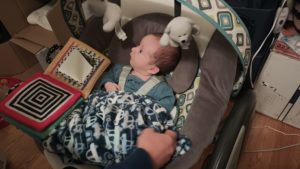
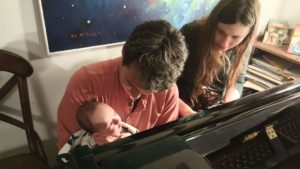

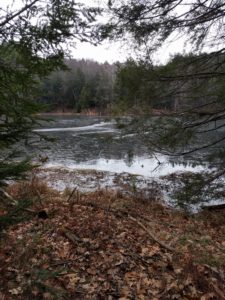 Yet there’s a subtle beauty to the season, we just have to take a little more time to find it. Poem #29 touched on the varying shades of November: ochre, rust, mauve, sienna, even if at times the month feels like treading shadows. Today, a foggy rain is covering the farm. The autumn leaves, all raked up, are in the shed, eventually to be mixed into the compost to nurture spring’s new growth.
Yet there’s a subtle beauty to the season, we just have to take a little more time to find it. Poem #29 touched on the varying shades of November: ochre, rust, mauve, sienna, even if at times the month feels like treading shadows. Today, a foggy rain is covering the farm. The autumn leaves, all raked up, are in the shed, eventually to be mixed into the compost to nurture spring’s new growth.